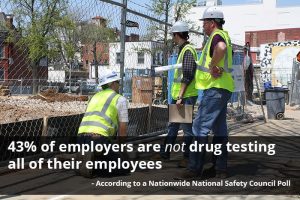CDC Investigated Nearly 58,000 Drug-Related Deaths During Five-Year Span
Substance-use disorders are both dangerous and costly. Unfortunately, they are among the most common conditions affecting Americans.
A recent study by the Centers for Disease Control analyzed the heroin and methadone-related deaths in 26 different occupations. The study showed that construction workers are by far the most vulnerable to overdose.
The study investigated 57,810 overdose-related deaths in 21 states from 2007 to 2012. They found that construction workers have a 1.34 proportional mortality ratio for methadone-related deaths and a 1.46 proportional mortality rate for heroin-related deaths.
A ratio greater than 1.0 means that the deaths in that occupation are greater than all other occupations combined.
Why Is This Happening?
Is there a relationship between opioid usage and the work environment? While the CDC strongly suggests that in-depth studies are necessary to obtain that answer, that are a few theories.
According to the CDC study’s authors:
“The variation by occupation group in this study leads to speculation about opioid initiation or use and the work environment. A single on-the-job injury (e.g., fracture or dislocation) or chronic work-related pain (e.g., caused by repetitive motion or lifting) might result in a prescription for pain medication.
Related: 10 Things Employers Should Know About Drug and Alcohol Testing
“Workers’ compensation data from 26 states (2013–2015) indicated that opioids were prescribed for 52%–80% of injured workers who received pain medications. Persons might also self-medicate or work in an environment with normative support for illicit drug use.”
It’s feasible that work-related injuries, coupled with the drive to continue working through those injuries, is leading to a higher overdose mortality rate.
The National Safety Council’s Response
The National Safety Council has created an initiative to prevent prescription drug overdoses and deaths. Last year, it released the results of a nationwide poll on opioids in the workplace.
Seven-out-of-10 employers stated that their businesses had been impacted by drug usage. Some of the reasons for those impacts include: Absenteeism, decreased productivity, and workplace injuries. Of those polled, only 19 percent felt “extremely prepared” to handle drug misuse.
Drug-use in the construction industry not only impacts the user, but can impact other workers as well.
Are You Testing ALL of Your Employees?
According to Tess Benham, senior program manager for the National Safety Council initiative, “We know that these substances – even when used legitimately as recommended or prescribed by a physician – can cause impairment or lead to errors or issues in the workplace that can impair safety.”
Related: Are You Compliant with OSHA Alcohol & Drug Testing Standard?
A major revelation that stood out in the safety council survey is that 43 percent of employers are not drug testing all of their employees. The NSC urges that drug testing should be a routine part of medical surveillance.
Creating a Drug Testing Program
It’s up to employers to create a policy that outlines which drugs are prohibited, and the consequences of using them.
Here are several steps recommended by the Substance Abuse and Mental Health Services Administration on how to create and enforce a drug policy:
- Identify any federal or state laws with which you must comply.
- Consult union officials, if applicable.
- Identify and contact a laboratory certified by the Department of Health and Human Services.
- Create a system that maintains and protects the confidentiality of employee drug testing records.
- Designate an employee who will receive test results from the lab and keep results confidential.
Add drug testing to your comprehensive medical surveillance program with Worksite Medical. Our mobile medical units can bring all the resources of a lab directly to your worksite.
Our services include other OSHA-required testing as well, such as: Respirator fit tests, mobile audio exams, silica physicals, and more.
Give us a call at 1-844-OCCUMED to schedule an appointment today. Learn more by visiting us online.




